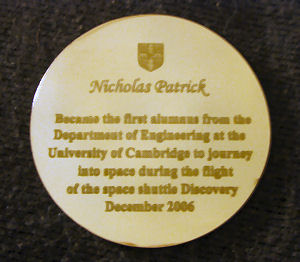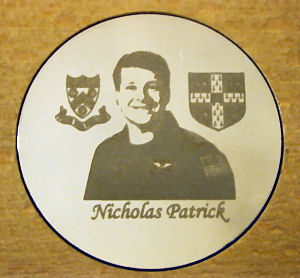Cambridge engineering graduate Nicholas Patrick (Trinity, 1982) is about to take his first flight as a NASA astronaut on the shuttle Discovery, having made it through the rigorous selection process, to become one of the 321 astronauts selected by NASA.



Patrick will be only the fourth Briton to go into space. NASA aim to launch Discovery at 9.36pm tomorrow Thursday 7th December.
After graduating Patrick worked as an engineer, a flight instructor, a programmer for a robotic company and a human-factors engineer. He has logged over 1,900 hours as a pilot in more than 20 types of craft, and trained as an astronaut since 1998.
The Times newspaper last week wrote, "Dr Patrick, 42, from Saltburn, North Yorkshire, and his crewmates are spending their final week in quarantine to avoid illnesses. It is an opportunity, he says, for some rest after the arrival two months ago of his third child and second son, Cameron. “I’m going into quarantine to catch up on some sleep,” he joked. His wife, Rossana, a doctor, and their two other children, aged 4 and 3, will be at the space centre at Cape Canaveral to watch the launch, with his parents Stewart and Gillian."
The mission, STS-116, is a construction and logistics mission to the International Space Station (ISS), the manned research space facility currently being assembled in ‘low’ orbit at about 220 miles Earth. The ISS means there is now a permanent human presence in space, as there have always been at least two people on board since the first permanent crew entered in 2000. The ISS was also the destination of the first four space tourists.
Patrick is taking with him a memento of the Department of Engineering where he was a student: a medal bearing on one side an image of himself with the shields for the University and Trinity College. The other side has inscribed, "Nicholas Patrick became the first alumnus from the Department of Engineering at the University of Cambridge to journey into space during the flight of the space shuttle Discovery December 2006". The medal designed and made by Ali Khan and Alastair Ross, was specially etched in the Department on surgical grade stainless steel using high power laser. Alastair Ross, the Department of Engineering's Workshop Manager, led the work and came up with the design concept. Ali Khan worked with Alastair on the design and used a computer controlled laser at the Department of Engineering's Centre for Industrial Photonics to etch the images and words onto the medal.
11 December 2006 - Update
The space shuttle Discovery has lifted off from Cape Canaveral - the first night shuttle launch in four years.
Discovery launched at 2047 (0147 GMT on Sunday), two days after poor weather forced a lift-off to be cancelled.
Rocket flares from the shuttle were visible in the night sky across much of the south-eastern United States.
The shuttle is heading to the International Space Station (ISS), which Nasa is racing to complete before the shuttle fleet is retired in 2010.
This is the third shuttle mission in six months and first night launch since the Columbia disaster in 2003.
While in orbit with the space station, Discovery astronauts will carry out three spacewalks and will rewire electrical systems inside the ISS.
For more information about the launch visit the NASA website http://www.nasa.gov/mission_pages/shuttle/main/index.html

